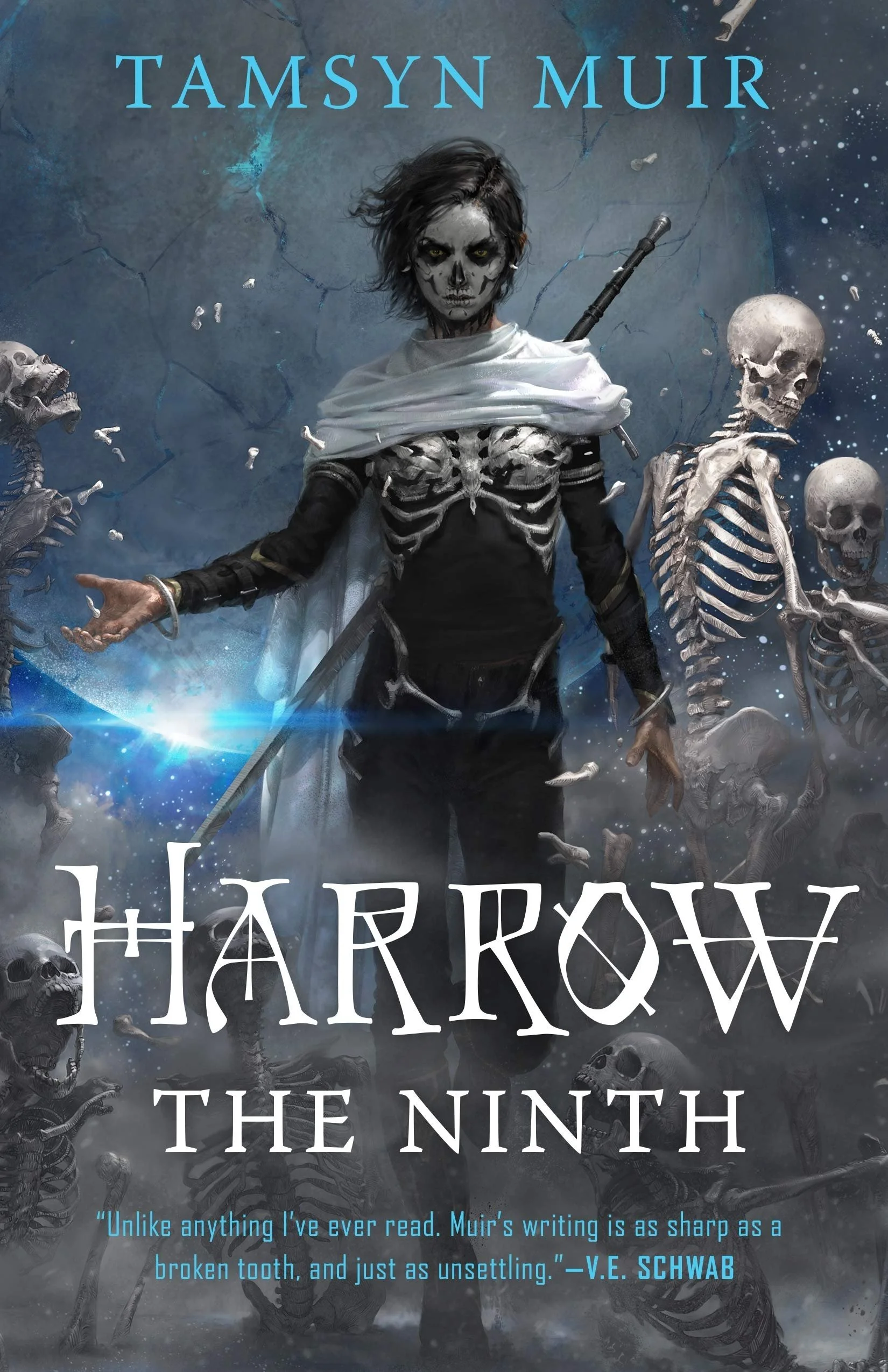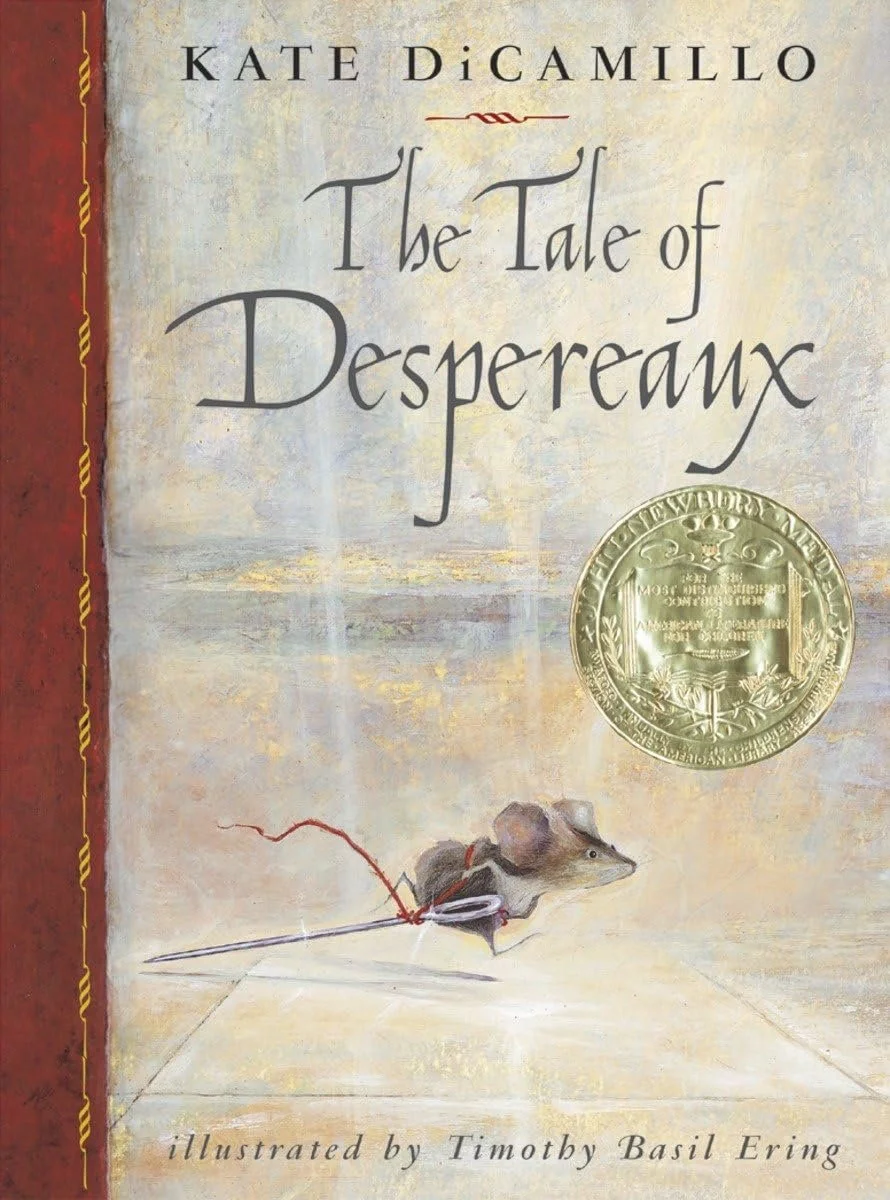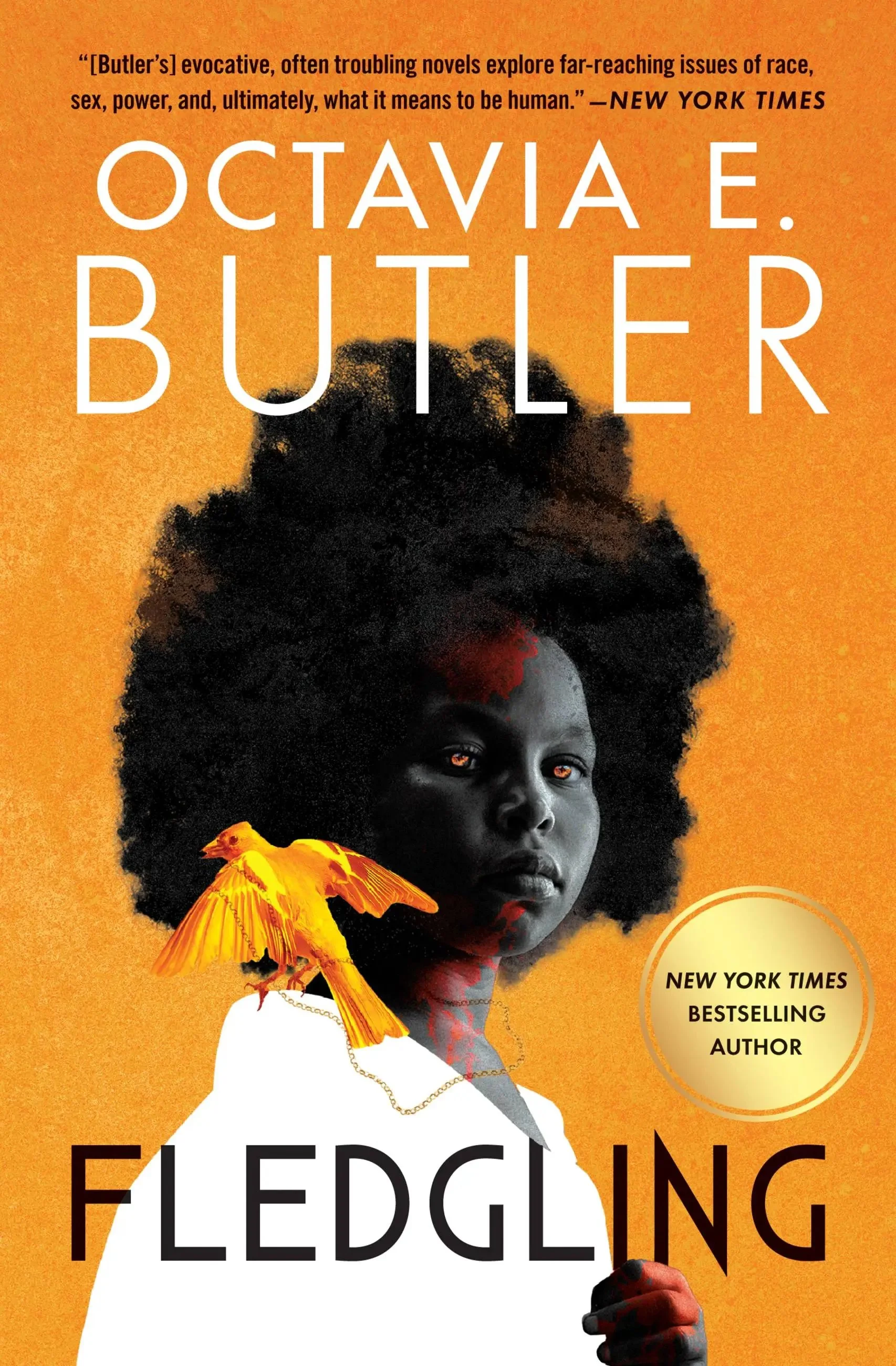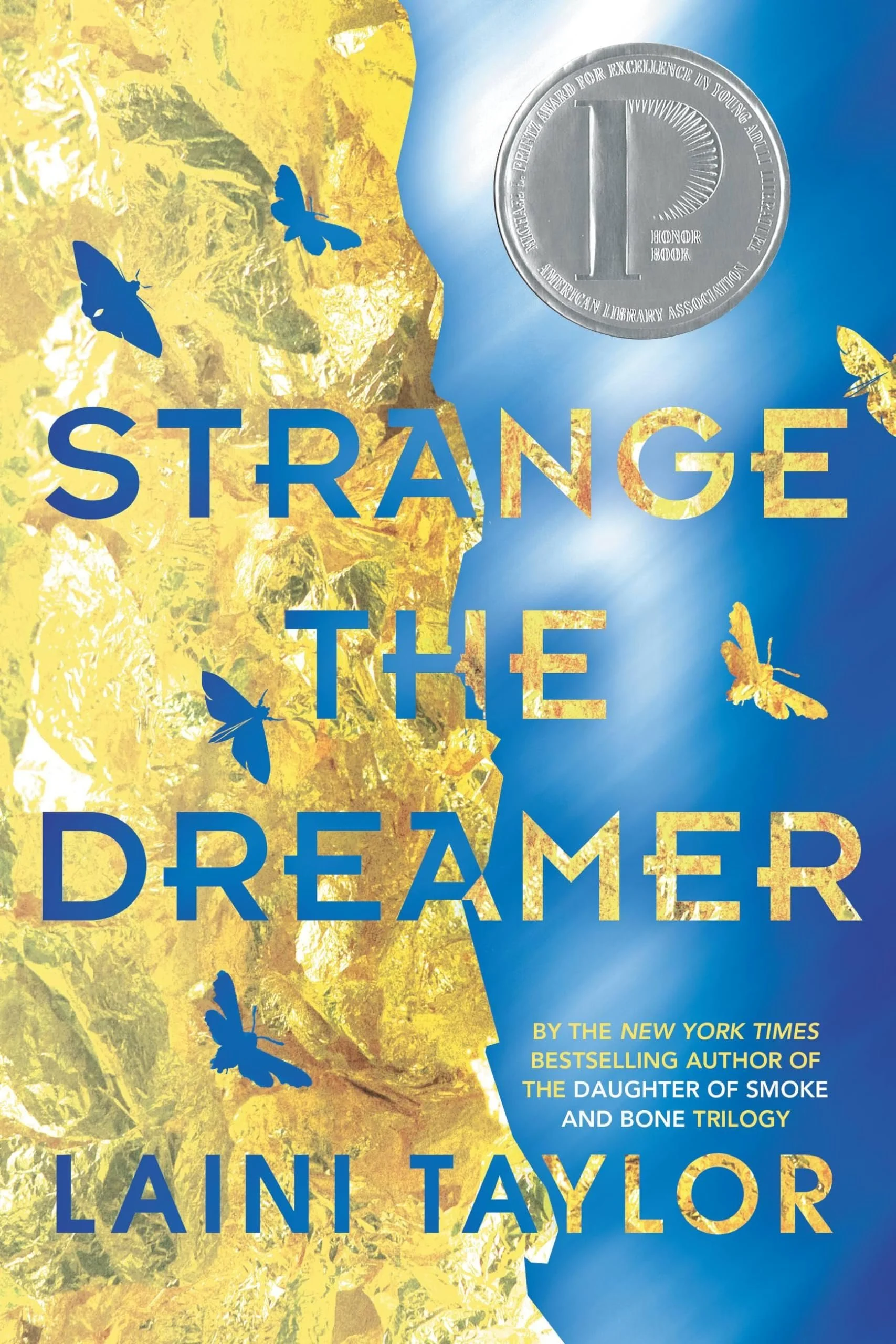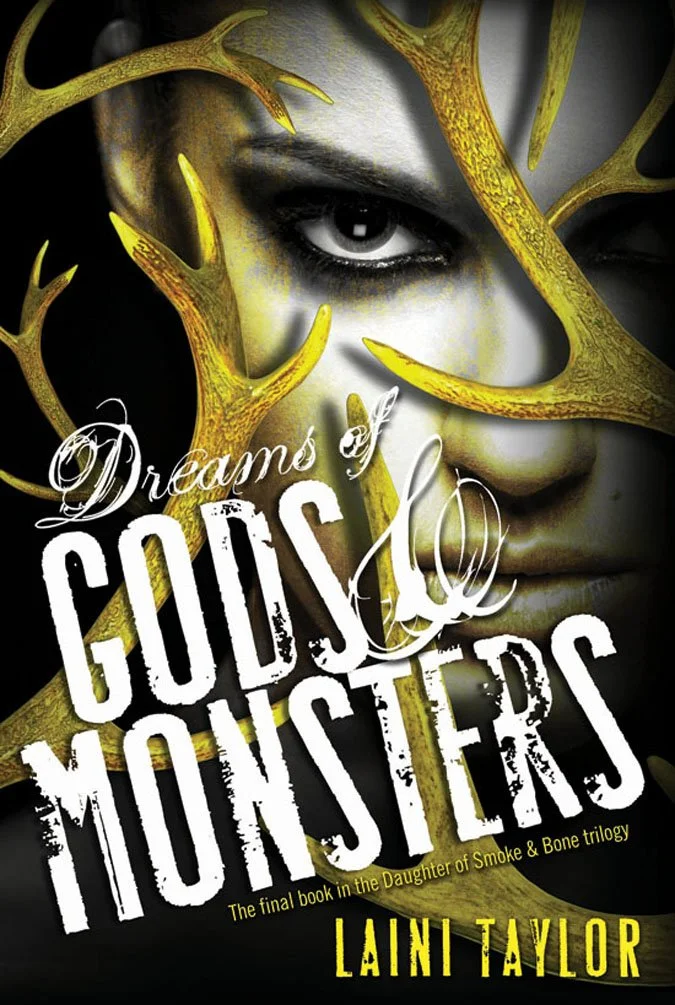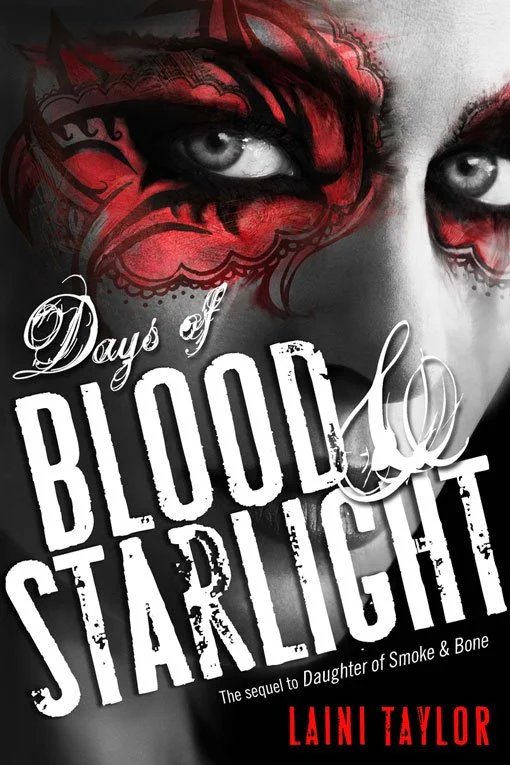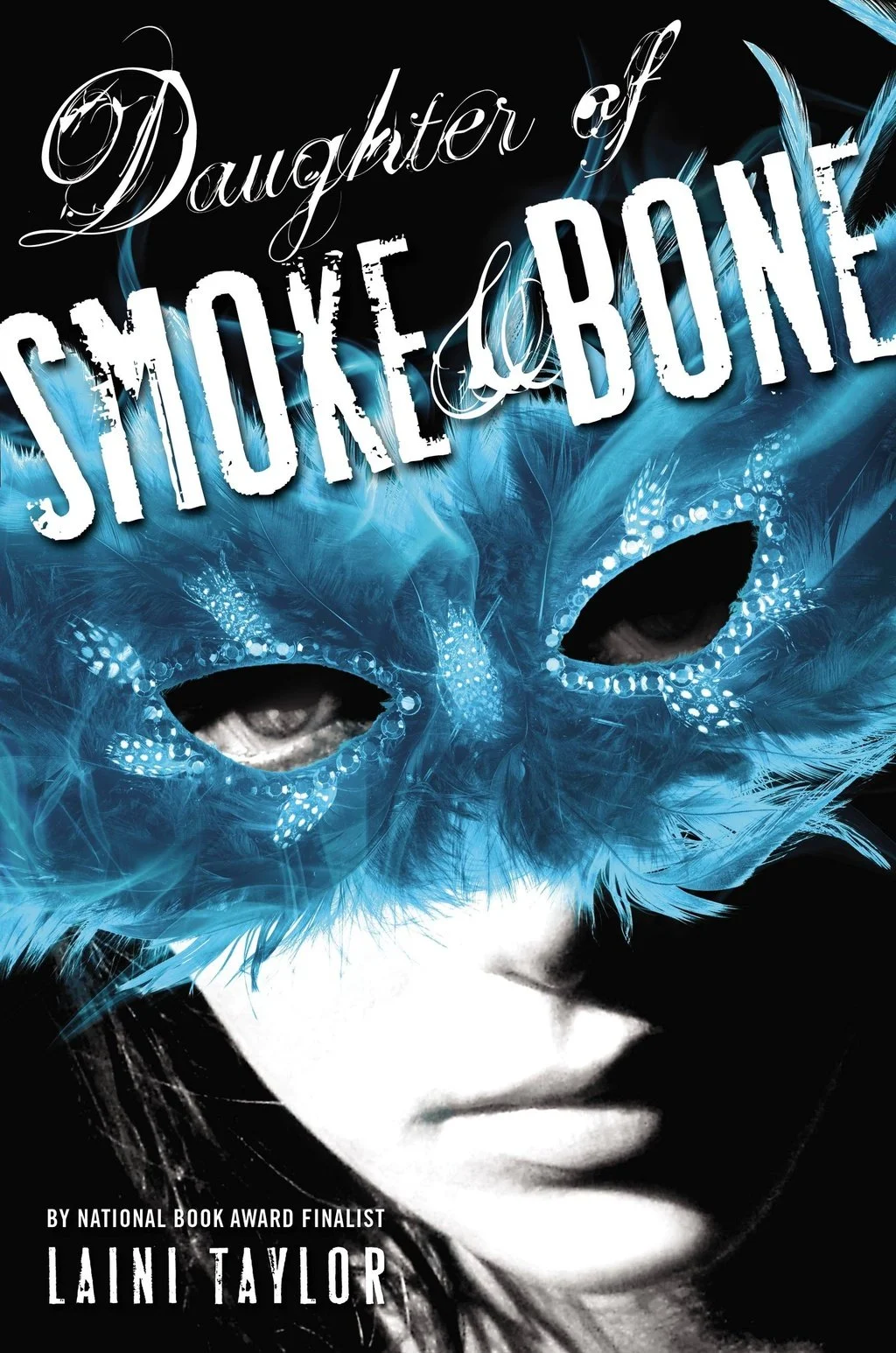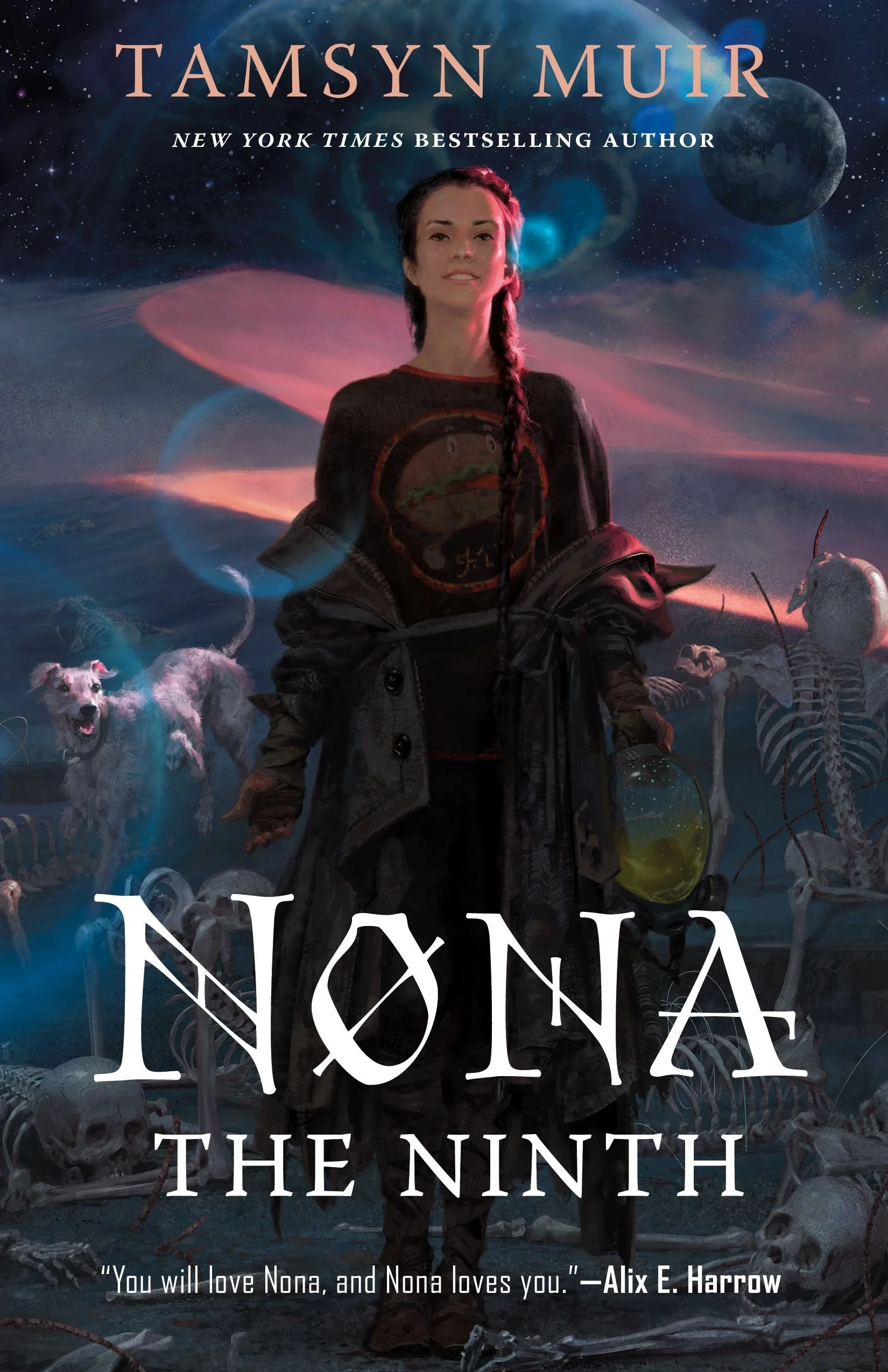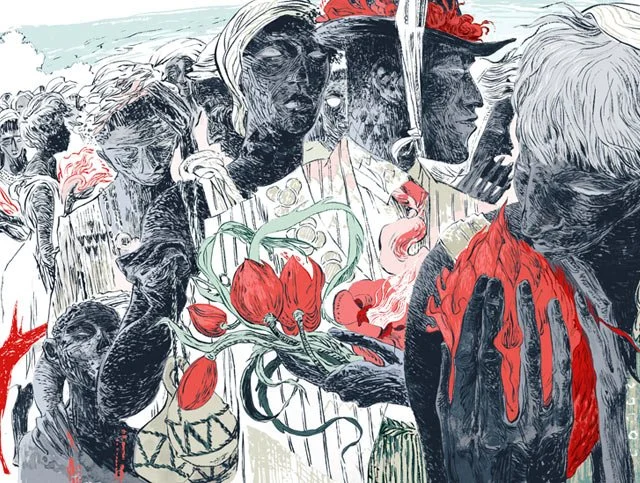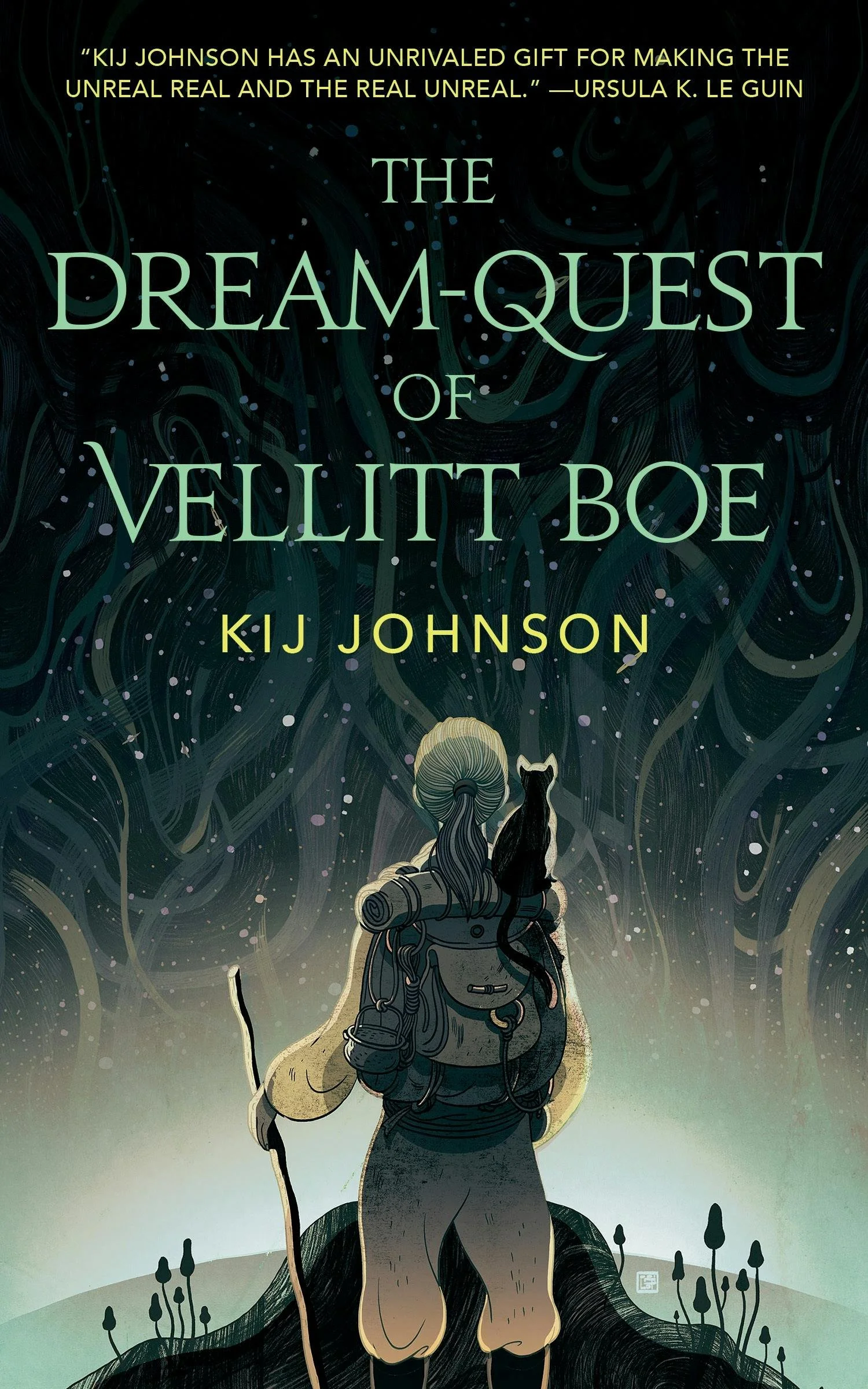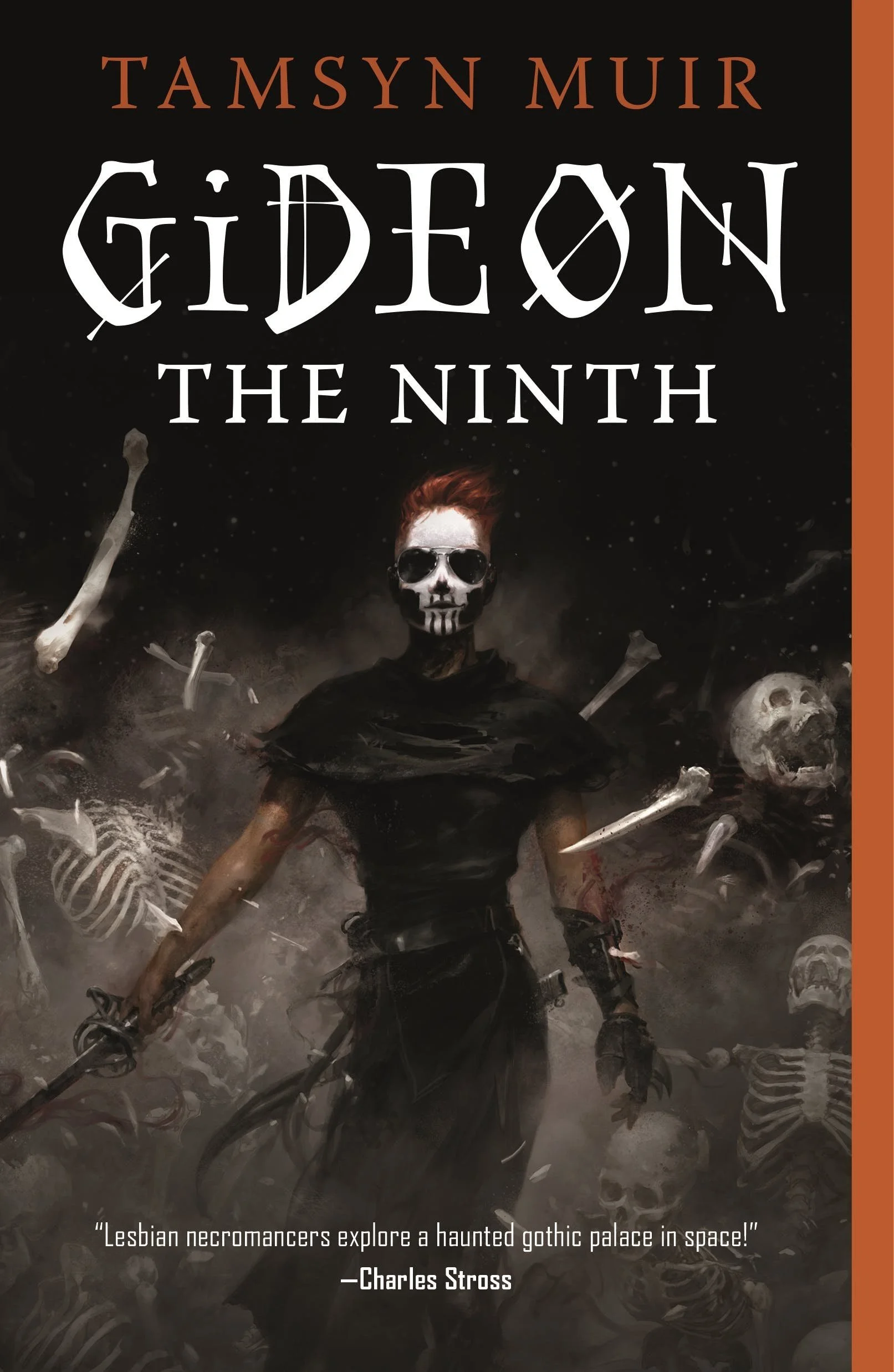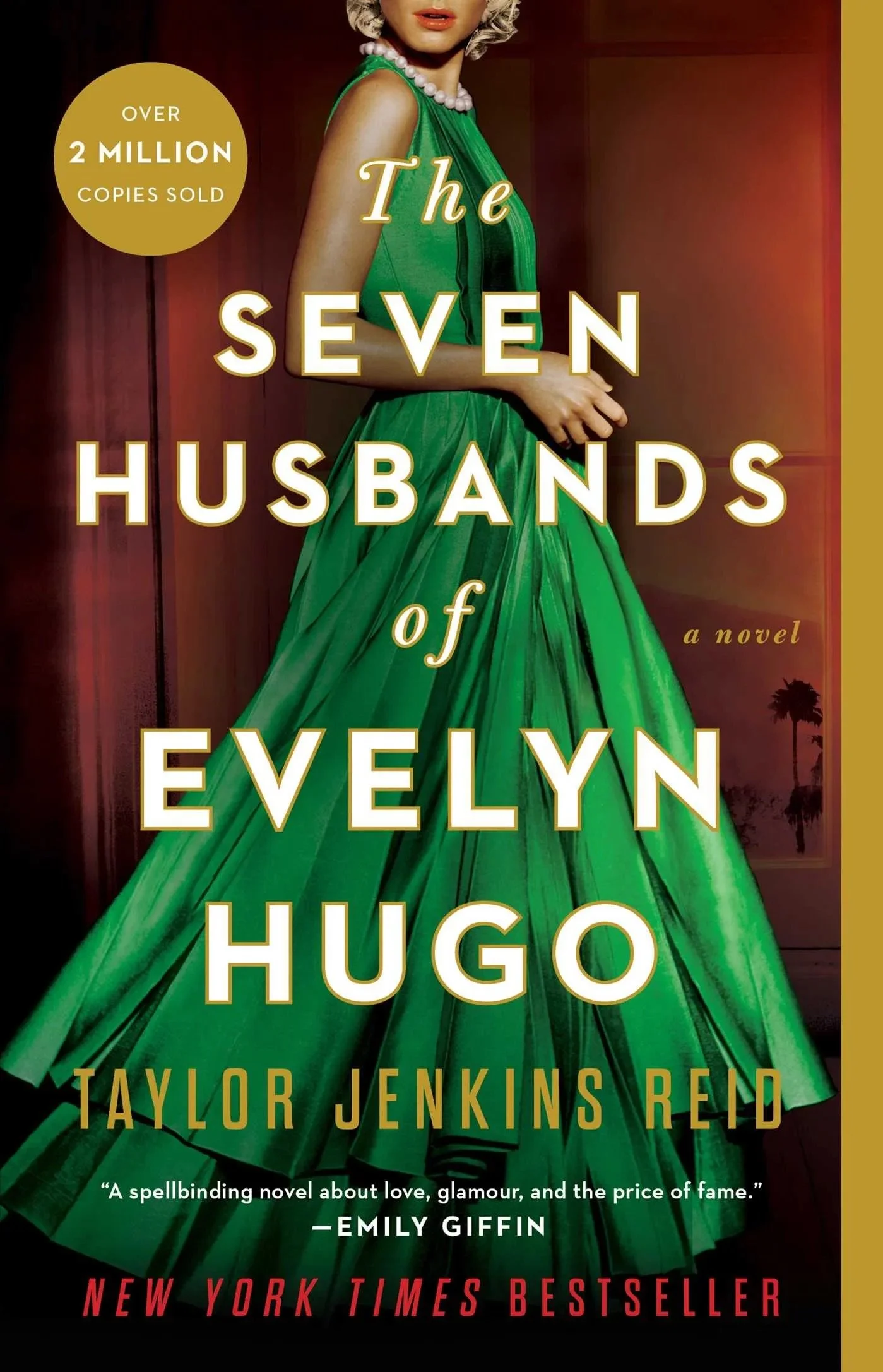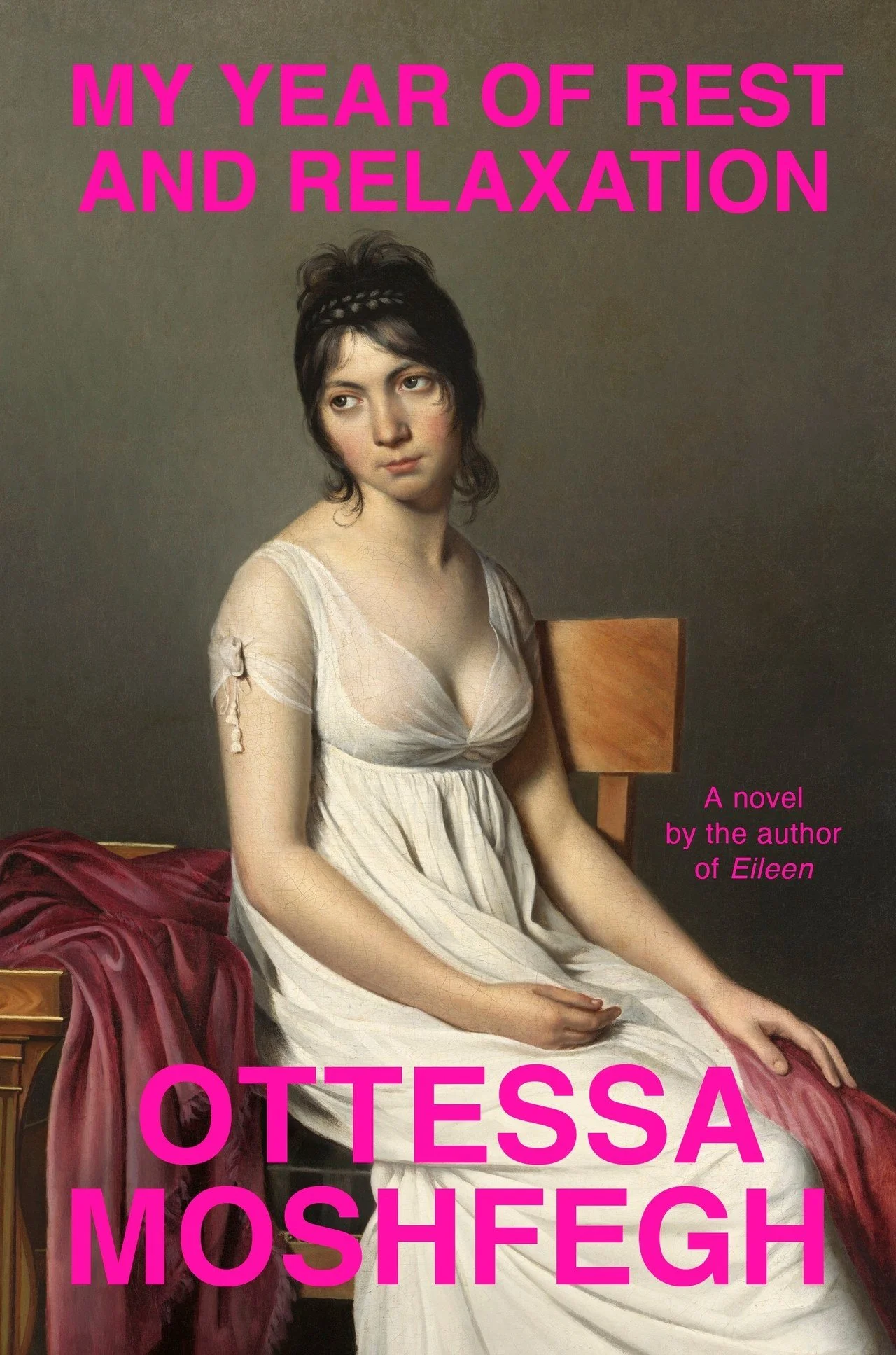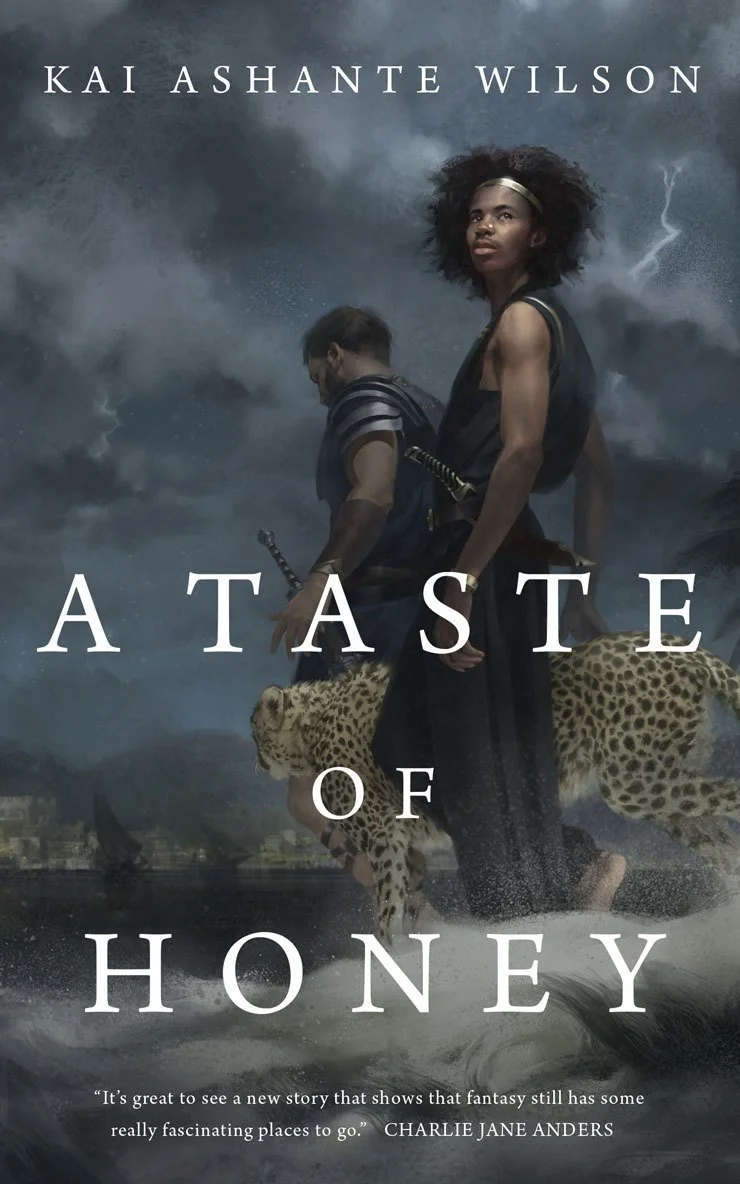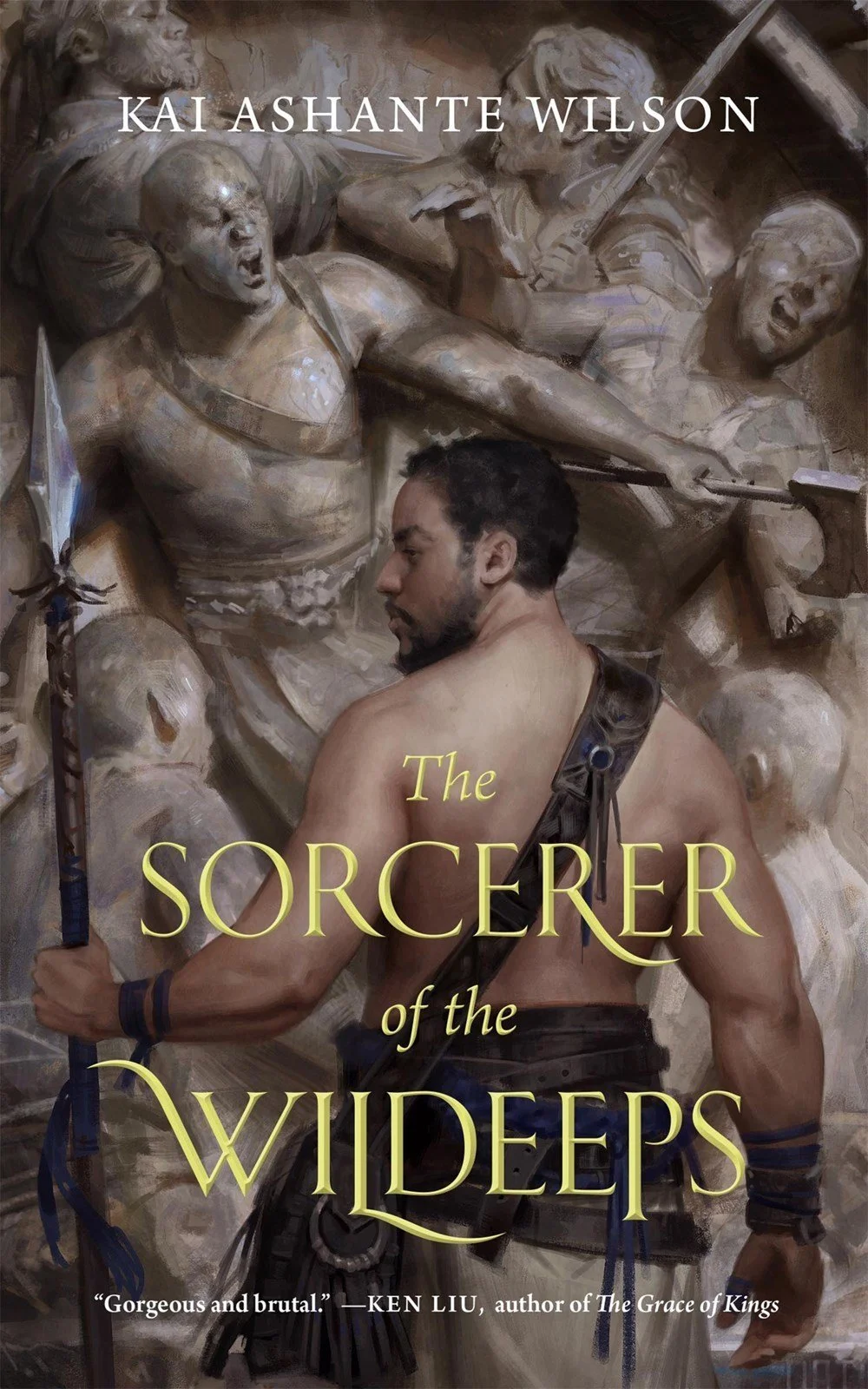2024 Reading List
24. Harrow the Ninth Tamsyn Muir
5/5 Reading Sounds: The Wizard And I by, Cynthia Erivo and Michelle Yeoh
First can we just take a second to note that as I edit this review on 9 December 2024, we still do not have a release date for Alecto the Ninth. I raced to finish this series before New Years this year, because everyone thought Alecto would be released before 2025, but in March 2024 Tamsyn Muir did an interview saying she was still writing it. So how do I find myself now a year later having read the series through twice and now having finished Harrow for the third time? It all started because I can’t stop myself from re-listening to the epilogue of Nona the Ninth. Too good, I would say. With several long car rides looming, I decide it can’t hurt to restart Harrow instead of listening to my usual playlists. Just for shits and giggles; but then, suddenly, I’m in too deep again. I make it to the soup dinner scene, I make it to the wine dinner scene. I realize this isn’t shits and giggles, and I admit to myself that I am going to finish Harrow the Ninth for the third time. This is the first time I have read any of Muir’s books completely on audiobook, and it was an ultimately novel and rewarding experience. For one thing, Harrow exhibits the slightest tendency towards the extremely dry, and her humor mightn’t immediately strike one as laugh-out-loud funny on paper. The entire series so far has been narrated by Moira Quirk, who does a fantastic job of characterizing and lending a unique voice to each character. Quirk’s voice won several laughs from me that the physical book did not. I think that hearing someone vocalize Harrow’s inner thoughts also lends weight to her insanity; reading the physical book, I felt myself drifting toward sympathy and often empathy for her as a protagonist. Quirk’s “straight-faced” delivery makes Harrow’s… idiosyncrasies… even more alarming. Quirk’s take on Ianthe was inspired as well, one of the highlights of listening to this on audiobook having to be Quirk’s Ianthe lewdly drawling, “Old people should be shot.” Where so much of the physical book felt like it was left up to interpretation, the vocal performances confirmed so much for me about the Harrowhark/Ianthe dynamic. The final act of this book, as always, blew me away, and it was even more rewarding for being on audio this time. The satisfaction of hearing Gideon’s literal voice break through finally is a high that doesn’t get old. Augustine and Mercymorn were also incredible performances. All of the references to Alecto in this book have me very excited for Alecto the Ninth as well. The way that Mercy and Augustine both reacted when they saw Gideon’s eyes–before they realized she was Gideon and not Alecto–felt like an easter egg. The way they kept talking about her–”She was a monster, John,” “She never could act human,”–makes Nona even more heartbreaking. I have this sneaking suspicion that Harrow’s infatuation with Alecto is perhaps parallel to Nona’s infatuation with Number Seven and the other revenant beasts. Mass murders and mass traumas call out to each other, maybe. This could also explain Harrow’s aversion to food and social awkwardness–which are both reflected in Nona. Now I need to read The Mists of Avalon and not start listening to Nona…
23. I Who Have Never Known Men Jacqueline Harpman
4/5 Reading Sounds: Rät by, Penelope Scott
This book has been all over TikTok as well as the Staff Picks shelf at my local bookstore for years. I Who Have Never Known Men is the story of thirty-nine women and one young girl who are being held captive in a metal cage in an underground bunker and guarded by patrols of men who do not speak to them and will whip them with literal whips if they break the rules. No touching each other, no sharp objects, no hiding from the guards’ sights, sleep when the lights are dimmed, and wake up when the lights brighten. The youngest girl does not have a name, because she was so young when she was taken that everyone just calls her the child. One day, an alarm they have never heard before startles the guards in the middle of delivering their daily food rations, and they are so surprised they evacuate before taking the key out of the lock. The child immediately runs to unlock and crawl through the slot, and lead all of the women out of the bunker to try and find something–anything–to help them get home. I think this is a coming-of-age story. A bildungsromane. But she has existed inside of this cage for all of her life that she can remember, so coming-of-age looks really weird here. Readers might be wondering why are they in a cage? Those readers will not have an answer by the end of this book. Plot-wise, this book made less and less sense as it went on. Initially I assumed it was just like a plain fiction novel, but from the beginning it felt very speculative, and then horror, and by the 3/4 mark it may as well be sci-fi. This book was disturbing, and it was sad; but, more importantly, it was indulgent. Harpman ignores the overtly obvious questions that readers would want answers to, and instead the questions being asked are too huge for her to attempt to answer: What makes us human? What is love? What does it mean to be a woman? What does it mean to be a woman who has never known men? Like, holy shit, what does that question even mean? And rather than try to answer it, Harpman asks the questions through a character who has no context for any of those words. Once you strip away the things that we associate with humanity, how do you then judge someone’s humanity? You kind of have to either throw your hands up and curse the author or just grow the guts to have your own opinion.
22. Shadows of Self Brandon Sanderson
3/5 Reading Sounds: Goodbye Horses by, Q Lazzarus
After finishing the original Mistborn: Era 1 series last year, it wasn’t immediately clear how this trilogy tied into the next one. Shadows of Self is the second book in the second era of Mistborn: Era 2–otherwise known as the Wax and Wayne series. It takes place several hundred years after the events of the original trilogy, and its steampunk cowboy aesthetic is a strangely natural progression to what was a pretty classical fantasy kingdom. Waxillium spent most of book 1 building backstory, and this second books biggest issue was the lack of growth in this area. Where some side characters were given more dynamic time in the spotlight, Wax had surprisingly little character development considering how frequently Sanderson writes from his perspective. Between the first two books in this series, it is starting to feel like a serialized crime drama rather than an epic fantasy. Respite from Wax’s monotonous scenes came in the forms of Wayne and Marasi. Sanderson loves to use Wayne’s humor to highlight some deeper sentiment that Wax is too busy jumping out a window to relate to us. Meanwhile Marasi is personal assistant to the Constable-General Aradel, giving a carefully placed peephole into the government without revealing anything of the nobility. Wax also meets MeLaan, a younger kandra who is only a few hundred years of age. Notably absent were Steris, who seemed to come into scenes for just long enough to remind everyone she’s still alive, and Ranette, who is talked about for longer than she is present. Alumni characters from the original Mistborn trilogy make cameos in this book, which is especially interesting because of the deification of their persons since the events of Era 1. At the end of The Hero of Ages Vin uses the shard of Preservation to destroy Ruin, killing herself in the process, and leaving Sazed to take up both Ruin and Preservation himself and become the god Harmony whom Wax is talking to throughout this book. The deification of Sazed is extreme when compared to that of the other Era 1 characters, but it throws these stories into interesting relief against each other. Unlike book one, this book has kandra in it, so it was a delight to see TenSoon show up, however briefly it may have been. Everyone keeps calling the kandra your grace because they are servants of Harmony, and the kandra are like omg please stop. The banter borders on Cassandra Clare levels of lunacy, especially once these quasi-immortal characters enter the mix. This is the first book that has begun casting more light on what is referred to as the Cosmere. Brandon Sanderson’s extended literary universe connects the Mistborn series to the Stormlight Archives as well as several standalone novels, short stories, and secret projects. Shadows of Self implies that these other series and stories based in the Cosmere are connected by other beings like Sazed/Harmony who have absorbed energies like Ruin and Preservation. It would follow that these other series would probably follow those characters in the same way that Mistborn: Era 1 followed Sazed’s journey to godhood. For both Era 1 and 2 of Mistborn, Sazed is the most fascinating character, and it’s not even a close call; here, he is removed from the story by several degrees, and yet remains a central piece of the story. The antagonist Bleeder asks Wax why Harmony allows so many terrible things to happen, like the tragic death of Wax’s lover and partner Lessie. If god is supposed to be all-powerful, why would Harmony move people in such evil ways? Sazed takes the powers of both Ruin and Preservation when he becomes Harmony, which has Wax and Bleeder asking if Ruin is currently winning out.
21. The Bright Sword Lev Grossman
3/5 Reading Sounds: Parlour Exotic by, E^ST
Arthurian legend is an intimidating place to ground a standalone novel like The Bright Sword and specifically tackling the death of King Arthur borders on arrogant, but here is a story that feels like a natural entry point to this canon. Grossman highlights characters who never received a proper showing in the larger catalog of Arthurian tales, giving them backstories and character arcs that are giving cishets the scaries. Sir Bedivere is Arthur’s right-hand man and was also in love with the king. Sir Palomides is Muslim, Sir Dinadin is trans, Sir Dagonet is the once-ironically knighted jester, and the cast goes on. Our protagonist is Collum of the Out Isles, a bastard who is neglected and abused by his lord guardian until he decides to steal the only legit set of armor in his household and run away to beg a spot in the Round Table. Only upon his arrival does he find out that King Arthur and his incestuous bastard son have murdered each other in the emotional aftermath of Queen Guinevere and Sir Lancelot being caught in an adulterous romance. Merlin has been murdered by his apprentice Nimue (the best part of this book by far), and the rest of the Knights of the Round Table have been lost to the cause of seeking the Holy Grail. Collum must team with the remaining scraps of the Round Table and find Britain a new king. Overall, this book was really good, but a few things kept popping up. Some of the representation and strides toward diversity were bordering on tokenizing. This feels like a dangerous critique to give, because that same representation is actually an amazing thing to see, but it’s frustrating to see characters stuck into their little cubbyhole character arcs: gay, Muslim, trans, etc. It would be wonderful to see characters like these be able to break the mold of their archetypes rather than just sort of kicking at the sides. Nimue was by far the best part of this story, and she is largely left on the sidelines (ironic for this story, no?). Grossman gives full chapter backgrounds for the main cast of characters in this book–some even get multiple chapters of backstory–and Nimue’s blows the rest away by miles. The magic system is captivating, and if nothing else did, the magical fight scenes made the entire book feel worthwhile. The knights are constantly discussing God and whether He is really coming back–or if he was ever there to begin with. If God is gone, what now? Can they go back to the old pre-Roman pagan British ways? What is a miracle, and what does it do to the humans who witness it? There were several points where huge info-dumps would come out of nowhere, and a character would soliloquize for a few pages for the sake of plot progression or explanation; not that it was bad, but it did drag at points, and had this been extended into a series, it could have been explained in a much more engaging manner rather than as a second-hand story. Whereas, in his Magicians trilogy, the story kept unfolding in ways that felt almost unrealistic to hope for, it felt at times unrealistic to hope this story would end. That being said, this was fully-actualized and self-contained standalone novel, which is a feat in and of itself in today’s publishing landscape. Kudos. That being said—and not lightly—there aren’t a whole lot of Arthurian-era stories in the modern pop culture lexicon for The Bright Sword to compete with. Disney’s The Sword and the Stone, Duvall Steer’s Wizardology, Monty Python’s Search for the Holy Grail. Honestly, not many come to mind, so the struggle to compete with them shouldn’t be so overwhelming. Maybe it is for this reason that the ending of The Bright Sword felt so underwhelming. It could have gone anywhere, really, but it simply didn’t.
20. The Tale of Despereaux Kate DiCamillo
3/5 Reading Sounds: sever the blight by, hemlocke springs
This book is one of the most formative reading memories in my life. I can imagine sitting at my desk in 3rd grade listening to my teacher read chapters of this aloud to the class between subjects or at the end of the school day. She did different voices for every character, and I can still hear her voice dropping into the dopey-sounding Miggery Sow. There was something monumental in the way that the perspectives shifted between sections of the book. Never before had I seen an author combine so many different seemingly-independent plots into one cohesive book. The story opens with Despereaux, trying and failing to learn how to behave like a “normal” mouse. Over the next few sections of the book, we meet the Princess Pea, a dungeon rat named Chiaroscuro, and an orphaned servant girl named Miggery Sow. They mention each other, and stumble through each other’s sections of the book, dropping little Easter eggs along the way. It is a beautifully put-together story, and a great introduction to the epic scope of fantasy stories that I would get into later on in life. Although it is not groundbreaking or genre-bending, The Tale of Despereaux is a fun read, and DiCamillo’s witty, light-hearted writing helps to pull young readers through a story that could otherwise be pretty grim. Rereading this is the first time I have ever realized that DiCamillo is the very same author who published Because of Winn-Dixie, which belongs to one of my favorite genres: “child-friendly trauma”. Despereaux never quite reaches the levels of horror achieved by something like Bridge to Terabithia, but that is not to say that it is without merit. And it definitely piques my interest to pick up Because of Winn-Dixie, a book I’ve never read even though I watched the movie several times in school. (Please note: I have not seen the movie version of The Tale of Despereaux, but the cast is kind of stacked, so I’m considering a movie night soon.) Overall, this was a nostalgically pleasant reread, but it was kind of hard to distance myself from the book because of this. And I flew through it. Would read again.
19. The Fifth Season N. K. Jemisin
3/5 Reading Sounds: 1914 by, Florist
This book has been on my bedside table for the longest time, and I’m not entirely sure why. I started it when I first bought it, but never made it past the first chapter. There is definitely some internet clout to contend with here, and this is the first book in a trilogy where every single entry won the Hugo Award during the years of their respective releases. Did it live up to the hype? I don’t know, honestly. It was a disservice to N.K. Jemisin’s world building to read this so soon after finishing The Will of the Many, because James Islington borrows so heavily and liberally from tropes and arcs that are prominently featured in The Fifth Season. That said, those borrowed aspects are executed far better in this book. Readers follow 3 perspectives throughout this book: Damaya, Syenite, and Essun. They live in a world called the Stillness, ironically named for its unusually high levels of seismic activity. Geomests are those rare individuals with the ability to control and direct geothermal energies, garnering themselves a reputation for being dangerous and detrimental to society. People are quick to blame these individuals for the deadly fifth seasons that begin every time the Stillness is rocked by global seismic events, sending the world into long periods of uninhabitability and death. This makes it difficult for those with orogenic powers to find community in most communities, or comms as they are referred to. There are oral traditions and rules referred to as stonelore passed down through generations teaching people how to survive fifth seasons, and it very heavily emphasizes the importance of living in a comm. Commless individuals during a fifth season are inevitable the most at risk. Readers follow young Damaya as her parents discover her gemoest abilities and hand her over to the government officials who train these type of children to hone and master their powers in the capital’s designated school for those with orogenic powers called the Fulcrum. Syenite is a trained geomest who is traveling alongside the most powerful geomest in the Fulcrum to carry out a mission in the countryside. Essun is hunting down her husband who has murdered her son and kidnapped her daughter. Overall, this was a gorgeously rendered world, with layers of metaphor and symbolism and a magic system that felt real enough to sink your teeth into. The pacing felt a little off at times, though, and some of the plot points felt like they were supposed to be plot twists, but the timing was slightly off. Jemisin has a habit of setting up these reveals so solidly that they are visible from chapters away. The characters were somewhat difficult to connect with at first, but by the end of the book there was enough gay shit going on that I kind of forgive her for it. I am excited to read onto the second and third books in this series, but I’m not sure when exactly I’ll build up the momentum to keep pushing.
18. Fledgling Octavia E. Butler
4/5 Reading Sounds: Short People by, Randy Newman
This book was, come on, say it with me everyone, “Fucked.” It was fucked. And Octavia Butler is fucked up for writing it. It was good, though. Honestly, I am at a loss for a title that centers on a child vampire that isn’t absolutely fucked. Let Me In… Breaking Dawn… its a foul genre. However, in addition to being shocking, Fledgling is also thought-provoking and surprisingly moving. Released in September 2005–just 2 weeks before Twilight–this is the first book in a planned trilogy, and it is also the last book that Octavia E. Butler wrote before she died 5 months later in February 2006 leaving this series perenially unfinished. Shori is a 50-year-old vampire who looks like a 10-year-old girl. She wakes up in a cave and realizes that someone has tried to kill her, and then she realizes she doesn’t remember who she is. She must gather human symbionts to feed from and help her move through this world, as inhospitable as it is for vampires, or Ina as she soon learns they are called. These human symbionts are adults, and they all usually have sex with Shori. This is upsetting to read about, and Butler does not shy away from details. Now, back to Twilight, the age gap between Bella and Edward is between 2-3 times that of the age gap between Shori and her symbionts, and yet people showed out in mobs and droves with goddamned T-shirts to show their support for Twilight–and not to mention, they watched Bella “grudgingly accept” the third corner of her own love triangle imprinting on her newborn baby before she has time to wake up after labor. I’m not a scientist, so I don’t know what that means, necessarily, but in context, I don’t think it would be very demure or mindful to turn around and dismiss Octavia offhand here. There is a lot to dig into with this book, it’s just not always palatable. Maybe a lot of the unresolved issues would have been resolved if the series been able to conclude as planned. However, reflecting on the Xenogenesis series I read last year, those problematic themes of consent and gender that were throwing out red flags at the beginning of book 1 had literally gone nowhere by the end of book 3. Regardless of taste, there was meat to the story and the ideas, but not everybody is hungry enough to eat it. It isn’t without merit, but this book is not for the easily squeamish or the unfortunately literal.
17. The Will of the Many James Islington
4/5 Reading Sounds: I’d Rather Be Me by, Barrett Wilbert Weed
The reputation that this book has garnered since its release only last year is impressive to say the least. Every other fantasy reader on TikTok and YouTube has reviewed The Will of the Many, and it seems that more often than not, it ends up on their “Best of Something” list by the end of the month. And if the general clamor wasn’t enough, there was a seemingly unanimous agreement that the end of this book is so mind-blowing that nobody sees it coming. The ending just wasn’t that good in all honesty. It maybe has the potential to be something good at a later point in the series, but for now it was kinda like, “Oh, that was the end?” And it was the end. That being said, Vis is a compellingly unreliable but compulsively readable narrator, something Islington leans into as far as he possibly can. He creates unbearable tension that somehow does manage to exponentially grow over the full course of this book. At the start of this story, Vis gets adopted into a powerful family and is sent to a famously competitive boarding school where he is to be trained alongside the progeny of the Republic’s elite. His social circle isn’t great to begin with, but by the end he is technically surrounded by peers, mentors, family, and friends, but, still, not a single character feels like a true ally. The secrets Vis keeps close to his chest–including those he hides from the reader–aren’t insignificant, so from whom is he supposed to ask for help who wouldn’t immediately turn him in? He can’t even find it in himself to blame the others, juggling his hatred of the Republic with his sympathy for those who grind away within its masochistic pyramids. They all live under the fists of an unimaginably powerful few, but those few are being constantly fed their power through the Will of the rest of the Republic (wink fucking wink). The magic system was another interesting part of this book, but the students at Catenan Academy aren’t actually allowed to use Will. The reader hears only theoretical discussions of it, and usually only snippets of classroom discussions or gossip. The scenes where Will is actually used are so few and far in between that it was pretty difficult to piece together the logistics of what was actually happening–or the dangers of what could potentially happen. By taunting we hungry dogs with bones of unrealized pathos and incomprehensible magic, Islington will doubtless keep up with the frenzy whenever book 2 is released, but the question remains what will happen after that.
16. Strange the Dreamer Laini Taylor
5/5 Reading Sounds: Head to Stars by, Jack River
I was 18 years old the first time that I read Strange the Dreamer. I was getting ready to graduate high school, preparing myself for a journey that cannot be truly prepared for. In some ways, it was the perfect time for me to read a story like this. Lazlo Strange is an orphan and an apprentice librarian who has spent his entire life reading fairy tales and stories, with a peculiar fascination with the nearly forgotten city of Weep. Nobody from this city has been in contact with the rest of the world in many years, and with no explanation as to why, even its original name has now been lost to the ravages of time. Strangely, nobody seems to even want to talk about it until Eril-Fane, otherwise known as the Godslayer, arrives in search of people who can help Weep overcome a secret problem that has been overshadowing his city, Lazlo jumps at the opportunity to help and travels with him to finally see the city that has captivated his imagination for so many years. Their troupe accrus an alchemist, a climber, an explosionist, a couple who invented a flying machine, and more, but to solve what problem remains still a mystery. As Lazlo finds out more about the strange situation in Weep, he is introduced to Sarai, one of the children of the murdered gods who survived and is living in hiding within the castle. Because, oh yeah, in addition to the Godslayer’s seemingly randomly assembled crew, there’s another cast of characters living inside the floating castle who have survived the fates of their families. Much like Laini Taylor’s Daughter of Smoke and Bone trilogy, this story centers around a war older than those involved, and it questions how hatred, fear, and hope can be sustained or nourished. Why would people fight in a war that they can’t remember the beginning of? Are children responsible for the atrocities of their parents? What does it mean to seek redemption? Is that a heroic story, or is redemption an inevitably selfish character arc? I have seen so many people say that this is one of their favorite fantasy books of all time, and after revisiting it, I definitely have a newfound respect for it.
15. Dreams of Gods and Monsters Laini Taylor
5/5 Reading Sounds: Gods & Monsters by, Lana Del Rey
Reading this series for the first time in such a long time–especially books two and three–has been a very intense experience. Days of Blood and Starlight ended with Thiago almost raping Karou and earning himself a knife in the throat right before Ziri unexpectedly returns from what was supposed to be a suicide mission into Eretz and convinces Karou to kill him and put his soul into Thiago’s body so that they can regain control of the rebellion the same night that Akiva and Liraz show up with Hazael’s corpse in the hopes that Karou can resurrect him (she can’t). The next morning, Zuzana shows back up at the kasbah to tell everyone that an army of angels has appeared on Earth and is soliciting the pope for nuclear arms. Karou and Akiva decide to combine the chimaera resistance the misbegotten soldiers Akiva is hiding in Karou’s (Madrigal’s) childhood home, the northern Kirin caves back in Eretz to organize a final fight against Joram. This is the realization of their original dream back in book one: to create a world where seraphim and chimaera could live side-by-side. They must confront the dissonance between dream and reality when these groups of sworn enemies do not want to mesh. When this was first released in 2014 it was in the midst of the big YA dystopian trilogy boom, and Dreams of Gods and Monsters definitely sets this trilogy apart from the rest by being a well thought out and satisfying conclusion. Sometimes it veers toward too clean of an ending, but this really lets the language and world building shine. In this book, Laini Taylor again cracks open this world much like she did at the end of book one. In book one, it is the restoration of Karou’s memories of her life as Madrigal that shifts the story from being a typical YA urban fantasy romance to something a bit more epic in scale. In this book, Taylor introduces a new character Eliza through whose eyes we discover the story of the Fallen seraphim who were cast out of Eretz so very long ago, and we learn how seraphim came to be known in Eretz as well as Earth. This story takes on a sort of creation mythos, explaining the coexistence of these worlds as well as the existence of many others long forgotten. These universes are layered like pages in a book, one next to the other. When the as-yet-Unfallen seraphim went to explore and map these alternate universes, they unknowingly drew the ire of some Lovecraftian beasts which chased them all the way back home, ripping through the fabric holding these universes apart in their wake. The Stelians–the only seraphim in Eretz other than Akiva who still practice magic in their far-flung Southern Isles–are finally able to seal up the universe behind the fleeing crew of explorer seraphim and have dedicated their lives ever since to holding the way shut in order to protect Eretz and, by extension, Earth. This book was fairly long (over 600 pages), but when you add in this lavish backstory that was plopped in at the very end of the series, it could have been even longer with no complaint. Some might say that the story goes on for too long, but in this book the characters almost take a back seat to the story they exist within, and it creates the sense of a world that doesn’t have to end. As the final page approaches, it feels like a journey just begun and readers will want to know more. This book is how Taylor explains the continuity between her books. The Fallen seraphim and their journey through the universes is the creation myth shared by her other series beginning with Strange the Dreamer, and rereading this series has definitely made me want to revisit that one as well.
14. Days of Blood and Starlight Laini Taylor
5/5 Reading Sounds: Back In Town by, Florence + The Machine
I used to reread Daughter of Smoke and Bone semi-regularly, but I don’t think that I have revisited the second or third books in this series since I initially read them upon release. After the events of book 1, Karou is on her own now–or something worse than on her own. She has found the surviving chimaera resistance and has become their new resurrectionist in the wake of the seraphic genocide of Loramendi and the death of Brimstone, all at the hands of Akiva who revealed the secret of chimaera resurrection to Joram (King Seraph) literally as soon as he was forced to watch the execution of Madrigal and then escaped Thiago’s torture chamber. I was pretty anxious that after not reading this book for several years, it wouldn’t hold up to how much I remember enjoying it when I was younger. Especially with the subject matter of this series, it can be a precarious line to walk. Early in this book, Karou is finally reunited with Zuzana–her human classmate from Prague–and has to fill in her friend on what’s been going on. When Zuz presses Karou for an update on Akiva, Karou responds something along the lines of, “Imagine Romeo and Juliet, except when Juliet wakes back up Romeo has massacred her friends, family, and people.” It becomes a stretch to believe that anyone could forgive–let alone fall back in love with–someone who has committed acts such as these. However, at the end of Daughter of Smoke and Bone, Karou regains the memories of her past life Madrigal and it seems inevitable that she will eventually forgive Akiva. Maybe it is the fairy tale feeling that runs through all of Laini Taylor’s work, but even all the angst and shadow in Days of Blood and Starlight couldn’t honestly convince me that these characters will not make up and kiss before the final curtain. The story and plot are so lush and ever-expanding that Laini Taylor more than gets away with it, and Karou never feels limited by her love story. Rather, Taylor leans into the exploration of how Karou is going to love Akiva in spite of these things. How does love continue to grow in the presence of hatred older than memory? Are people who do bad things irredeemable? Do they deserve to be happy again? The love story is central to the plot, with an ultimate ending that feels somewhat obvious and a premise that is straight-up uncomfortable. Taylor is able to spin this dreadful combination to her advantage and generate enough tension to tease out readers’ wonderings for (at least) two books (Spoiler alert: book 3 is really fucking good too). Going into this re-read, there were several scenes that I remembered from the last time I read this (over ten years ago): Zuzana dropping a pee balloon on Kaz in the opening chapter (didn’t actually happen), Ziri being crucified with swords and ripping his hands into horseshoes while escaping (worse than I remembered), Ziri falling and his horn hitting the ground so hard that the tip snapped off (just as bad as I remembered), and Thiago trying to rape Karou (…). Whether surprising or not, this entry into the series is aptly titled. While I know Laini Taylor’s writing for its magical feeling and whimsy, for this book specifically I was expecting viscera and gore because that is mostly what I remember from it, and I wasn’t wrong. Laini Taylor’s tendency toward purple prose and vivid imagery doesn’t falter when she gets to these intense scenes. Whether it be Thiago’s demeanor in every scene he shows up in, a body horror heavy sequence like Ziri’s hands and horns, or even a passing description of the self-inflicted bruises Karou uses to tithe for magic, the unflinching strength of the writing makes everything hit all that much harder. This book feels like a war story, not a love story. It is both, though. Taylor brings up cake a lot, and chocolate, comparing them to happiness. They are desserts, and you can’t just have dessert whenever you want; you have to earn it. Days of Blood and Starlight is not not work, but it is so delicious it might as well be dessert.
13. Daughter of Smoke and Bone Laini Taylor
5/5 Reading Sounds: Starburned and Unkissed by, Caroline Polachek
I don’t even know how many times I have read Daughter of Smoke and Bone at this point. When the final book in this trilogy was released, I am not sure that I ever went back to reread the second or third book in this trilogy–because of their size more than anything–but, I have revisited this first book more times than I can remember. Laini Taylor’s writing has always been some of my favorite, and over the years, this has become quite the comfort read for me. At just over 400 pages, this book introduces readers to Karou, a seventeen-year-old, blue-haired art student living in Prague who runs teeth-collecting errands for her inhuman foster dad Brimstone who lives on the other side of a magical door she’s pretty sure leads somewhere not on Earth. This series starts out feeling like a classic YA urban fantasy romance–complete with a chosen one, a snarky best friend who provides the best dialogue in the book, and even some insta-love, for good measure. Maybe it is because I read it during high school, or maybe it is because of how many times I have reread this book since high school, but this feels like a blueprint for YA fantasy. As readers follow Karou on her journey, they uncover the gut-wrenching meaning behind the teeth she collects for Brimstone and the terrible cost of the wishes that he pays her with. In this book, Karou’s life is still largely anchored on Earth, and this creates an atmosphere that is at once familiar and not. Readers will have an accessible jumping-off point here, especially for a series that makes the leap from this YA urban fantasy beginning to to the high-fantasy world where it all ends. Taylor does an excellent job of introducing readers to the world, and opening up the story one piece at a time. The writing is intricate, and the prose compliments the story like ivy climbing a wall. The pacing of this book is something to behold, as well. It is hard to say exactly where things take off, but from humble beginnings in art class and hipster Czech cafés, this story reveals multitudes. Laini Taylor is able to go from high school drama–boys and homework–to a fantasy war story without ever feeling off-beat. It has been a long time since the last time I read this book, though, and the light-hearted feel of it definitely strikes me differently than it used to. This was my favorite book of the series when I first read it, and I think this was largely due to the whimsy Taylor writes into every line. This aspect of her writing lends itself to a sort of fairy-tale aesthetic that isn’t always so present for the rest of the series. At the end of this book, the reality of Karou’s situation comes crashing down on her, and everything is launched at full speed into the rest of the series. This book feels sweet, innocent, playful, young–but the ending strikes a stark contrast. In what could be considered a coming-of-age story about a magical teenage girl, Karou has finally come of age. She has grown into herself in more ways than one, and readers are left with the question of what she can possibly do now.
12. Nona the Ninth Tamsyn Muir
5/5 Reading Sounds: The Prawn Song by, Superorganism
It was a bit daunting to pick up this series again so soon after reading it. I mean, these were some of the last books I finished last year. To be fair, I started Gideon fairly early in the year and struggled through the first half for nearly 6 months before it clicked for me. There was a sense of disorientation the first time through. I didn’t know what to pay attention to, and by the time I figured that out, it was already time for the next book. That does seem to be Tamsyn Muir’s signature style: alluring and incomprehensible. But this reread of Gideon, Harrow, and Nona somehow took less time combined than the time it took to read Gideon the first time. And as I’ve said over and over since restarting this series, it felt like a completely different experience this time around. And while rereading the first two books felt like an easter egg hunt, looking around for the bits and pieces I missed before, this book was almost completely transformed. Nona is a brand new character when she shows up, and just knowing who she is at the beginning of this reread completely shifted my reading experience. It kinda blows my mind that I read this the first time not knowing who Nona is. I also couldn’t drag my mind away from thoughts of how this book fits into the overarching plot of The Locked Tomb series as we know it. Muir has made it known that Nona was unplanned, born of a too-long introduction to what was supposed to be the third and final entry in this series–Alecto the Ninth. Taking into account that this book is canonically classified by the author as a glorified prologue to Alecto is so insane, because this book tackles so many points of the overall story that have been shied away from or circumnavigated up until this point; the political reasonings behind all of the conflict between Blood of Eden and the Nine Houses are finally expanded upon; the living conditions of the displaced populations affected by John and his lyctors’ thousand years of work distracting the Revenant Beasts; the history of humanity’s undoing and John’s (unreliable, at best) account of how he brought about the apocalypse that he is worshipped for saving everyone from succumbing to. Many of these questions are asking after such essential pieces of the driving conflict behind the plot that it makes one wonder how Muir was able to lead readers up to this point without incident. Maybe the reviews claiming her writing style is “too confusing” are the resulting casualties of this stubborn muddying of narrative, but the satisfaction of rereading this book and finally seeing all the pieces slide into place far outweighs the frustration of pushing through the first time. This is absolutely one of those situations where the more you read it, the more you will find to enjoy, but there won’t ever be an experience quite like reading this for the first time and not knowing what the fuck was happening. After this reread, I definitely feel a fuller appreciation for this book, and the series as a whole, and I loved finding answers to questions that I came out of my first read-through not quite understanding. There were also plenty of characters that I didn’t realize it was so important to pay attention to the first time I read the series–Camilla, Palamedes, Coronabeth, and Ianthe to name a few. Once again, thinking about Nona in terms of being the introduction to Alecto makes the entire series feel a bit more fluid and continuous than I was previously aware of. The characters I assumed to be “side characters” aren’t the throw-away personalities I assumed them to be at first. Ianthe spends most of book 1 hiding and trying to be ignored, and Coronabeth spends most of this time performing in the wake of Ianthe’s disappearing act. Being able to trace threads such as these made the second and third books all the more sweeter. It really cannot be said enough how much better this book becomes upon revisiting it with a fuller understanding of what’s going on. I am unsure if I would read this again before the release of Alecto the Ninth–but, who am I kidding? I probably would and will. For now, all I can do is cross my fingers that Muir releases another short story in the meantime.
11. Harrow the Ninth Tamsyn Muir
5/5 Reading Sounds: When There Was Me and You by, Vannessa Hudgens
I can’t confidently say that I am surprised that The Locked Tomb series is better on the second read-through, but I have to admit some level of shock at how much better it is. When I got caught up with this series the first time, Harrow was immediately my favorite entry out of the the three which have been published so far. Gideon the Ninth could sometimes feel a bit like Deadpool where the jokes are coming so fast and hard that it almost feels like overkill for Gideon to be so heavy-handed with the sarcasm and general snark on top of things. Much like Deadpool this book also feels like a holding place for Easter eggs and morsels of backstory that are key to understanding what just happened in the first book, because–let’s face it–Gideon didn’t know what the fuck was happening, and there was no way she could explain it to the readers. It was an unexpected respite moving from such a confused headspace to the more intellectually-driven and deadpan perspective of the Reverend Daughter Harrowhark Nonagesimus the Ninth, Heir to the House of the Ninth, and the Ninth Saint to serve the King Undying. This last bit is important, because we just ended Gideon the Ninth seeing Harrow eat Gideon’s soul in order to become the ninth lyctor to serve God. So why is Harrow still unable to access the full reserves of her newly-discovered lyctoral abilities? This is where book 2 picks up, and Harrow spends the majority of this book trying to convince the reader that nothing out of the ordinary is happening, everything is okay, and she doesn’t have anything to worry about except some slight bouts of insanity which have begun to rip apart her waking life at the seams. Oh, and she’s also trying to convince herself and the reader that Gideon doesn’t exist, or that she didn’t exist, or something. The first time reading it, I was so confused that I couldn’t do anything but keep pushing forward and treading water, trying not to drown. This time it was so mind-blowing to see all the trapdoors and hidden meaning that Tamsyn Muir was able to plant from the beginning. Whereas the plot twists and reveals were shocking and confusing the first time, seeing them hanging at the back of the stage just out of our main characters’ fields of vision might be even more suspenseful somehow. Dramatic irony or something like that. It was also shocking to see the structure of the plot in this second book. It feels like so much is going on, but when the main pieces of plot progression are mapped out, there truly isn’t that much going on. And Harrow is such a delightfully cynical perspective to read from that everything becomes a joke in a very perpendicular way to Gideon. If I could give this more than 5 stars for the second read-through I absolutely would, but alas.
10. The Mysterious Study of Doctor Sex Tamsyn Muir
3/5 Reading Sounds: Oath (feat. Becky G) by, Cher Lloyd
The Locked Tomb series has so many standout characters, upon finding out that there is a canon short story featuring Palamedes and Camilla it became an immediate top priority. Muir takes a deep dive into the childhood of the sixth house’s necromancer adept and cavalier primary, following these two characters at 13 years old while they are still in what seems like school? Military training? It isn’t 100% clear, honestly. Together these precocious sixth house trainees solve a mystery that was on track to stump an entire posse of librarians and research assistants. Overall, this story didn’t add much to the canon of The Locked Tomb series, and fans of Gideon the Ninth need not worry about missing some big plot point by not reading this short story first. If anything, this short story feels like due diligence after making Camila and Palamedes such central characters in Nona the Ninth. They love each other so much that they spend most of their time on the page searching for the perfect path to Lyctorhood, and this venture back to their childhood gives this search much more of a tangible weight than the passing comments made in Gideon or Harrow. This story is also the only look readers have gotten into life in the Nine Houses outside of Drearburh or Canaan House. While it was nice to beef up the characters of Camilla and Palamedes, this story did feel a bit lackluster. And although there were some interesting points in the story, it mostly served to make the reader even more curious about all the characters who haven’t been in a short story yet, or more curious to explore the rest of the Nine Houses that readers haven’t managed to breach yet. It was a great way to spice up this current re-reading of The Locked Tomb series, as I wasn’t even aware that this short story existed the first time I read the series. Hopefully this isn’t the last short story of its kind. I think I’d part ways with several fingers for a story like this about the Tridentarius twins growing up in the Third House.
9. A Well-Fed Companion Congyun “Mu Ming” Gu, Kiera Johnson (translator) (Illustrated by, Park Inju)
2/5 Reading Sounds: Knowing Me, Knowing You by, ABBA
It was like the daemons from The Golden Compass, but with robots, and turned contemporary. Mu Ming’s A Well-Fed Companion follows feline-companioned Hairou who’s getting to know the new guy in the office—whose spirit companion is also a cat. The driving force of this story feels to come from the idea of living as a cat-person in a dog-person’s world. When the low white noise of her colleagues absently playing with their dog familiars underneath their desks during work ceases every day for the lunch-hour and Hairou is left alone to peer down from the window at the trails where everyone enjoys their break alongside their canine robot familiars it’s not unreasonable for her to miss her cat at home. It’s not like Hairou can bring a cat into an office filled with dogs every day. The concept and the premise are fascinating, but the short format of the story (“It’s a short story,” says the lumpy man pawing at my window) feels limiting here. Maybe it is because a lot of the short stories I read are from larger fantasy worlds I have already read about, but I struggled to latch onto what was going on or feel invested. The spirit-animals themselves were interesting, but Hairou’s narrative didn’t necessarily veer far enough towards them to properly scratch that itch. She is understandably more focused on their application within her own life. It is mentioned in passing that people were once known to have spirit animals like a snow leapord, elephant, or whale, but now she doesn’t know anyone who doesn’t have a house cat or a dog. Is this because she lives in a city? Because people are boring? Do the computers just not give anyone any other animals? It’s not like there aren’t interesting things about this book, but they seem to whip by faster than the story can dive into them. The ending felt strangely sober and gravely hilarious, and yet abrupt. Hairou never felt deep enough to personally connect with, but that is certainly in-line with the other obstacles she faces. Overall, this was interesting enough to revisit and probably would be even better after having time to sit.
8. Super Bass Kai Ashante Wilson (Illustration by, Wesley Allsbrook)
3/5 Reading Sounds: Super Bass by, Nicki Minaj
Kai Ashante Wilson’s fantasy universe launched with The Sorcerer of the Wildeeps in what was kind of a tough sell as far as first books go. What ended up being a very rewarding read did take what felt like conscious effort to push through. The prose was delicious, and readers can procrastinate the labor of moving on across the plot with the excuse of letting Wilson’s language take them under. But at a certain point readers will keep reading and probably find themselves asking what is going on? The narrative these stories use doesn’t really slow down for world-building, and most of the time it feels as though key details of the world are only being forked over only just as routinely as they become relevant enough for a character to explicitly state it. Otherwise, it’s kinda just touch-and-go. The next book A Taste of Honey made up for this in a lot of ways, focusing more on the human aspects of its characters, remaining in one location for the majority of the story, and honing in on a love story above all other plot points. This was an improvement for many reasons, but mostly because of the sheer length–or lack therof. However, it could just be that the more one knows about this world, the more enjoyable each individual story becomes. A reread may be inevitable… Kai Ashante Wilson has created a fantasy world that feels very realized. It feels like every time one is able to enter this fantasy realm, one is able to come away just a little bit steadier on their feet for next time. In this way, although this was technically released before The Sorcerer of the Wildeeps was ever published, it does feel much easier to move through having already finished both novellas currently set in this world. This short story follows Gian, a twenty-three year old ex-soldier who has recently returned from war. He has been low-key dating this boy from a neighboring village named Cianco, and although his family hasn’t met him yet, Gian feels like this love is special, maybe even moreso because of how quickly he has fallen into it since escaping the bloody viciousness of war. His 3 parents (because marriages are only for sets of 3 partners) are worried that Gian hasn’t introduced them yet because of their low social ranking, and readers soon come to find that this may be closer to correct than Gian initially lets on. Cianco is actually the Summer King, and Gian is accompanying him to his village as the Summer King’s lover. Super Bass felt rooted in the human emotion of Gian’s struggle to own his love for Cianco, and this feels like a stronghold for Wilson. A lot of his most powerful and gripping stories are love stories, regardless of the fantasy or political elements going on in the background. This was an extremely readable and enjoyable short story, and it is just another tantalizing morsel in this magical universe that Wilson has created.
7. The Dream-Quest of Vellitt Boe Kij Johnson
3/5 Reading Sounds: meta angel by, FKA twigs
The world that The Dream-Quest of Vellitt Boe lives in is one that feels all at once unrecognizable and familiar. Although author Kij Johnson based this story off of an H. P. Lovecraft novella The Dream-Quest of Unknown Kadath, I went into this story without any previous context regarding the original source material. I wasn’t sure if I would need to Google the original to read up on the backstory or if I would be OK as is, and in this sense, readers can confidently read this book without needing to worry about missing out on anything or not being able to follow the story. That being said, there were many themes that come up throughout the novella which have a different level of impact when one understands what Johnson is reacting to in the original text. This novella follows the story of esteemed professor Vellitt Boe as she travels across the dream-lands she lives within to catch up to a runaway student from her college before she is able to cross over to the waking world. During Vellitt’s journey, she is constantly reminded of how her gender and identity affect her journey. The way that people treat her in passing, the way that she is forced to present herself, the way she must re-contextualize the journey she is on through the lens of each man she must deal with along the way. Not to say that it doesn’t feel grounded, but with the context of Lovecraft’s original story, it makes so much more sense what it is grounded in. The total absence of women in Lovecraft’s original novella, the ever-present racism and sexism throughout his repertoire, these are things that cannot be ignored; Johnson’s choice to root this story in such a setting (in such a canon) is intriguing, and there are many instances of her peeling back a layer of this canonically fucked-up setting to expose a sore spot that may or may not ever be resolved. What does it mean that a world dreamt of exclusively for and by men only has ninety-seven stars in the night sky? Lovecraft is a figure that can be polarizing in many respects, regardless of the impact he had on literature as a whole. It is interesting to note that when one looks up reviews for this book, one of the top hits on Google is a review from the H. P. Lovecraft Historical Society giving this story 1 star, noting, “One gets tired of hearing about all of the racism and sexism in the works of H.P. Lovecraft. My opinion is that if his writing has so deeply offended you, simply close the book and read something else.” I have yet to decide whether this is earnest stupidity or rather genius parody. It is reminiscent of reading Fight Club and wondering where the disconnect lies: did the entirety of society misunderstand the meaning or did its author? These are important questions to be asked, and fantasy as a monolith has yet to reckon with them. Johnson is one soldier in a war that spans as far ahead in time as our imaginations can take us. And although a war may seem far-fetched, reviews like those left by the literal H. P. Lovecraft Historical Society should make readers take it seriously. Can authors inspired by Lovecraft still hold him accountable for the racism and sexism that characterizes his canon? If they can’t where does that leave Lovecraftian horror besides last century? Only time (and the readers) will tell.
6. Gideon the Ninth Tamsyn Muir
5/5 Reading Sounds: Kids on the Boardwalk by, Hop Along
Reading this book the first time, there was an overwhelming sense of urgency to re-read it, if not immediately, then as close to immediately as possible. The amount of lore and world building going on in Tamsyn Muir’s Locked Tomb series is brain-numbing, and the first time reading it can feel like a blind stumbling and groping towards the ending. Mammoth disembodied pieces of exposition and background information disguised as canonical jargon whip past first-time readers, leaving nothing but colorful chemtrails of ambience and mood in their wake. It is not to say that the first-time reading experience with this book is not worthwhile or enjoyable, but there is so much to be absorbed that cannot possibly be appreciated appropriately until readers gain the holistic context of. books one and two and three (and four?). It was a somewhat difficult decision to reread this book so soon after reading it for the first time (within a month or two, really), but the fact remains: This book begs to be revisited before the first visit is completed. Reading characters like Dulcinea and Protesilaus, or Coronabeth and Ianthe, with the ending of the first book in mind–as well as the context provided by later entries in this series–made for a brand new reading experience. The rereadability of this series is genuinely insane. And this is coming from a reader who didn’t totally enjoy Gideon the Ninth the first read-through. It took a good 3 or 4 months to finish it the first time, though admittedly this was in large part due to its confusing nature. Shocking, exhilarating, REWARDING: these words come to mind when thinking about the difference between the first and second reading of this book. What was a 3-star rating throughout most of the first reading became a solid 4 stars thanks to the absolutely shell-shocking climax, but upon rereading it has become 5 stars through the sheer amount of easter egg hunting set out for returning readers. This book was delightful, even more so the second time through, and Muir’s writing will definitely leave readers wondering if there is more to be uncovered in Gideon after the final installment of the series Alecto the Ninth is released (whenever that may be). Long live The Locked Tomb rereads, and the King Undying!
5. The Seven Husbands of Evelyn Hugo Taylor Jenkins Reid
2/5 Reading Sounds: Casual by, Chappell Roan
This book was such a crazy ride. That may be in part due to the medium it was taken in through–audiobook. The longer this book has to sit, the higher the highs seem, but there were a few nagging issues that stayed at a heel throughout. Readers follow the story of legendary Hollywood star Evelyn Hugo from the woman herself as dictated to the surprised, new journalist Monique Grant who is to break this exclusive, tell-all story. Evelyn’s sordid past is told in seven chapters, her ex-husbands. Early in the story Evelyn states she never married the love of her life and costar Celia St. James (“I was surprised at the LGBTQIA+ theme,” sayeth the wide-eyed straight). Think Valley of the Dolls with less slurs, but with more homophobia. Evelyn also makes a point multiple times to emphasize her Bisexuality, calling out the biphobia and bi-erasure she has experienced as well. This was surprisingly thoughtful, but confusing when taken with the context of the general plotline. There are unbearably cringey moments like Evelyn finding out her best friend is gay when she asks him why he’s never made aggressive sexual advances on her at work. His response: “You’re not my type.” And she just knows. In retrospect, that is truly hysterical though. Then there are decadently unhinged moments later in the story that honestly balanced everything out in a lot of ways. Overall, I ended up liking this less than I thought I would when I started it, but way more than I thought I would when I was halfway through it. Not sure when I’ll pick up another book from this author, though.
4. Yellowface R. F. Kuang
3/5 Reading Sounds: Crocodile Tears by, Ängie & Skoj
After reading R. F. Kuang’s Hugo-snubbed historical fantasy epic Babel last year, it was very exciting to read her first foray into literary fiction with Yellowface. And what a switch-up it was. The scale of the story, the narrative focus, and the pacing were all incredibly different from anything Kuang has written before. Yellowface follows June, an author whose first and only novel has not had the commercial success she had hoped for. When she witnesses her college-best-friend-turned-bestselling-author-turned-supposed-archrival Athena die one night in her apartment during a pancake-eating contest, June steals her latest work-in-progress manuscript, fills in the blank spaces, and gets it published as her own work. June is an incredibly dislikable protagonist (reminiscent again of The Old Man and the Sea, The Catcher in the Rye, My Year of Rest and Relaxation), and as Yellowface is written entirely from the first-person perspective, there is no reprieve from her awful inner dialogue. There were many things about this book which were enjoyable: the insider look at the publishing world, Kuang’s deft inclusion of themes from previous her previous work (“Every act of translation is an act of betrayal”), and the surface-level idea of using an unreliable narrator. What could be a by-the-book book-about-a-book is transformed from a classic lit fic piece to a possibly queer romance to a social media epic to a thriller to a ghost story. What begins as a simple and straightforward plot spirals into just as hectic and unhinged a fallout as you would expect from such a setup. However, the grating personality of June and the general online-ness of the book began to take its toll towards the middle/end of the book. It was reminiscent of Catcher in the Rye in the way that the protagonist was so aggravating that any initial emotional investment was fastidiously scrubbed away by the time the middle of the book rolled around. The last 100 pages or so were an exercise in seeing how long the protagonist can believably drag this out. And it was believable. As outrageous and long-winded as this plot can come across, not one part of the novel seems too far-fetched to be reality except for the parts that are most likely exaggerated or flat-out lied about by June herself. Did she really try to help Athena not choke to death, or did she just stand by and watch? Is June’s mom really that cringey and annoying, or is June just trying too hard to convince the reader? Was June’s first novel really overlooked, or was it just bad? At the end of the day, the quality of the writing and overall plot outweigh any personal issues with the novel, and it does seem like a book that may be more enjoyable the second read-through. Without the constant stress of wondering when the hell with this finally be over? readers may be able to rest a bit and sink into the spectacularly spoofy drama that Kuang creates.
3. My Year of Rest and Relaxation Ottessa Moshfegh
5/5 Reading Sounds: Landmines by, St. Vincent
This is the first time I have read My Year of Rest and Relaxation since I wrote my 2020 review of it. That review was posted about 2 months before COVID, and so much has changed since then. I remember reaching the end of a mad 2-day haze where I read this book almost 3 times back-to-back, and writing a review that veered closer to a rant-y voicemail than a thoughtful critique. I had finished this book, immediately gotten my sister to read it (“This makes me very sad for you, Aaron,” she said upon finishing) and then passed it to a friend (whose reaction also seemed less enthusiastic than my own). A large part of the reason I haven’t read this book again since then is, I guess, because I was kind of worried that it wouldn’t live up to the excitement I remember feeling upon reading it that first time. I shouldn’t have worried, of course, because after picking this up again on a whim, I was pleasantly surprised that My Year of Rest and Relaxation still hit the same key notes it did for me last time. While Moshfegh’s narrator in this book is nameless, whiny, annoying, and generally intolerable, her perspective and story remain completely engrossing and compulsively readable. In my last review I compared her to Holden Caufield as well as Hemingway’s old man (the one with the sea), and that comparison has only grown funnier to me since then. These are characters who move through their stories largely alone, isolating themselves from the world. Most of the human interactions in these stories are minimal, forcing readers to learn about them through their own convoluted and twisted narratives of what is happening. Holden bitches at readers for the entire book about how awful and phony everyone is; meanwhile, he is seemingly on a douchebag tour of his own, hitting up everyone he can think of to do absolutely nothing except remind them why they’ve been avoiding him for so long. In The Old Man and the Sea, Santiago has taken this monumental task of catching this giant fish onto himself, with little to no direction from anyone else. He spends the whole book chasing a self-imposed task of life-changing significance (according to himself), and weirdly this also feels parallel to what’s going on in MYORR. The protagonist has realized that she needs to do something about the state of her life and has created a monumental goal to achieve for herself. She knows this sounds crazy, and she doesn’t know exactly why this is so important, but it is passed off as a sort of rebirth. It takes these themes of self-discovery and turns them on their head. The protagonist is dedicated to losing her own adult self in order to find a newer, stranger, hopefully better, version. It is almost like an inverse bildungsroman–the loss of self acting as a cleansing or renewal. The more I think about it, the similarities between this book and Old Man and the Sea keep striking me as the most significant. I remember reading OMATS in 8th grade and writing a book report about how much I despised it, and maybe that is why the comparison appeals to me so much here. While MYORR’s protagonist is definitely on a journey parallel in structure/meaning to that of Hemingway’s Santiago, Moshfegh does not write with the sympathy of someone who has lived long enough to search out this rebirth. Rather, the protagonist is almost a cartoonish portrait of early-2000s neuroticism and burn-out. And as outrageous as that comparison may be, if you follow this thread back to the near-fatal journey of the wizened Santiago, it only gets funnier. It feels like a gut-punch to readers of the classic self-discovery novel. There were definitely moments that remain cringey still (that ending, though), but overall this remains a 5-star book for me. And as laced with anxiety and spiral-inducing lines of thought as it is, it somehow remains a very comforting read regardless. I am glad that I was able to find the time to reread this, and I am now considering a revisit of some more of Moshfegh’s works this year.
2. A Taste of Honey Kai Ashante Wilson
4/5 Reading Sounds: Buyer’s Remorse by, Daniel Caesar (feat. Omar Apollo)
Don’t be confused–A Taste of Honey is not book 2 of Kai Ashante Wilson’s fantasy series he began in 2015 with The Sorcerer of the Wildeeps. Rather, this 2016 novella A Taste of Honey is set in the same universe as its predecessor, but that is pretty much where the similarities end. Where The Sorcerer of the Wildeeps felt like an adventure story following Demane as he traveled south with the Captain and their caravan, focusing on the dangers and epic scale of this journey, A Taste of Honey is much more static, focusing instead on the romance between royal cousin and animal-whisperer Aqib, and a handsome visiting soldier Lucrio. The scale of this story felt much more restricted than Wilson’s debut, but this is in contradiction to the massive world-building that occurs within this sophomore novella anyway. Although there is no great journey across the continent taking place in this book, readers will still discover new information and lore regarding the history of this fantasy world. It was very satisfying to get more interactions with the gods who are discussed almost tangentially in Wildeeps. With the context given in this book, it makes sense why Demane felt so alienated during his travels south through the Wildeeps. The politics and social issues discussed in this book made the world feel all that much more real, as well. This was largely done through Aqib, who as a close relative of the royal family, has much access to the behind-the-scenes goings on around the kingdom. He was not necessarily a great protagonist, though, and at times, he gave demon twink energy. Not saying that’s necessarily bad, but it did become hard to root for a character who went around treating people the way he did. His family interactions were engrossing, though, and the sympathy this built up throughout the story led up to a very satisfying and emotionally-draining climax. With only 160 pages, the amount of trauma Wilson is able to tap into is truly astounding. Towards the end, there was a sense of foreboding, knowing that something bad is coming. The idea that reading slower, and spacing out reading sessions would lessen the emotional toll of such a book. This was not the case, and readers are likely to still be taken by surprise by the ending. There was a point where certain outcomes felt inevitable, but Wilson was able to subvert these expectations while still rending tears from the most cynical readers. This book was not a continuation of its predecessor, and after the initial shock of this realization, readers will not be bothered by this in the slightest. Kai Ashante Wilson was able to take this world and show not only that it works on a global or national level, but it works on an individual and emotional level as well–like world-building in reverse almost. Or inverted or something. Either way, this was absolutely devastating in the best way possible. Here’s to hoping that this won’t be the last exploration Wilson leads readers through in this world.
1. The Sorcerer of the Wildeeps Kai Ashante Wilson
3/5 Reading Sounds: Running up that hill by, Blue Pearl
In a 2020 interview with Tamsyn Muir (The Locked Tomb series), the author was talking about being a part of the 2010 cohort of the Clarion sci-fi writing workshop and said, “[Among] my less stealthy fellow Clarionites are names like John Chu, Kai Ashante Wilson, Leah Thomas, Kali Wallace, Karin Tidbeck, Greg Bossert. Imagine being at Clarion for the first time and you’re handed your first ream of paper and told it’s a Kai Ashante Wilson story. You just dissolve. Your ego dies.” After seeing praise like that it’s basically impossible not to check out what all the hype is about. The Sorcerer of the Wildeeps is Kai Ashante Wilson’s first published book, and every line of this book was delicious. At just over 200 pages, this is not a long novella by any means, but that does not mean that readers should rush through it. The language is dense and savory, with prose that begs to be read twice, thrice, and then again. Wildeeps follows Demane, a demigod living on Earth after most of the gods have eloped to live in the heavens. Demane is part of a caravan approaching the Station at Mother of Waters, the last point of civilization before they enter the Wildeeps as they travel south. His divine heritage seems to be a semi-understood thing amongst the men of the caravan; they do not seem to explicitly understand–or at least admit that they understand–that he is a demi-god even as he performs miracles in front of them along their journey. They are superstitious to the point that Demane feels the need to hide his demi-god status to some extent, but they still don’t mind enough to turn down the fruits of Demane’s unexplainable efforts. They are willing to scramble for exonerating explanations as to how their dear friend Demane can perform these mind-boggling feats. Everyone is willing to accept these oddities without question, except for the Captain whose azure hair would expose his divine lineage if he did not keep it covered up so fastidiously. The Captain works as the middleman between the merchants funding the caravan and the brothers employed by the caravanmaster. Their travels have been normal until recently, as they approach the edge of the Wildeeps. Demane with godly senses predicts they will soon encounter a sabre tooth jukiere, a fearsome beast they are ill-prepared to face. Wildeeps essentially follows the caravan as they approach and eventually enter the Wildeeps and eventually must defeat the awful jukiere. The plot felt a little vague at times, and it was easy to meander into the setting and look around instead of focusing on the main plotline. While it was atmospheric and captivating, the ending didn’t quite stick the landing. It was a definite ending point, but the treatment of Demane’s and the Captain’s fate felt dispassionately handled; these complex characters felt like set pieces in something larger, something not yet revealed. And while this book does succeed in telling a self-contained and -sustaining plotline within this amorphic, yet unexplained larger scheme, the question Why? lingers. There is a second book in this series, but The Sorceror of the Wildeeps doesn’t give any indication of where the second book may be headed. There is no clear direction to move in, and so readers who need a clear and directive overarching plotline may feel frustrated. Vibes, atmosphere, and worldbuilding are the focus here, and, that being said, these aspects are all painstakingly delineated. This book refuses comparison and begs to be read over and over again.


